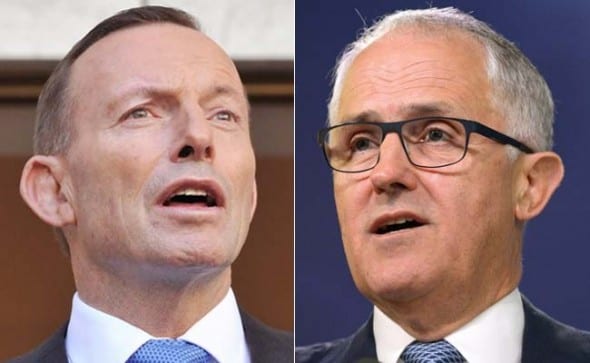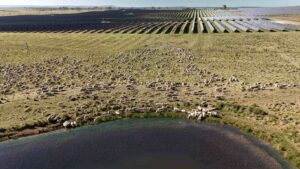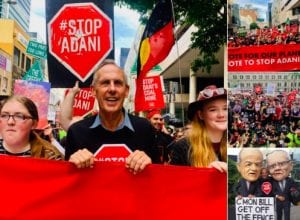Remember Tony Abbott? He was the leader of the Coalition government who thought that climate change was crap, dismantled the carbon price, trashed the Climate Council, and tried to dismantle the Climate Change Authority, the Australian Renewable Energy Agency and the Clean Energy Finance Corp.
Tony Abbott brought investment in large scale renewable energy to a screeching halt by threatening to kill the renewable energy target, and then cutting it sharply, so encouraging a capital strike by major utilities. He also threatened to decimate the ranks of climate scientists through major cuts to the CSIRO. He said he hated the sight of wind farms, and said he thought coal was good for humanity.

Remember Malcolm Turnbull? He was the former Opposition leader who enthusiastically launched the Beyond Zero Emissions Plan for a rapid transition to 100 per cent renewable energy in Australia in 2010, who spoke of the moral and economic importance of acting decisively on climate change, who spoke of Direct Action as “irresponsible” and a “fig leaf” for a climate policy, and who spoke of many fine Liberal policy initiatives in whole sentences.
Nearly six months ago, something strange happened. Malcolm Turnbull became prime minister after Tony Abbott was dumped by his own party. But nothing changed. If the swap had been made by deed poll or a cardboard cut-out, the practical impact on climate and clean energy policies would have been no greater.
The carbon price is still scrapped, the “fig leaf” remains the centrepiece of the great policy misnomer Direct Action; Australia’s emissions are surging to a record high; the capital strike by utilities continues and large scale renewables investment remains at zero; the legislation to repeal the CCA, ARENA and the CEFC has not been withdrawn; coal is still considered good for humanity, and even a solution to hunger; and 300 or so climate scientists have just been told, in the parlance of modern football, to “do one” by the CSIRO and find another job.
Yet, in spite of all this, all Turnbull needs to do to be assured of election victory this year – in the absence of a credible opposition leader – is to make sure he does not actually morph into Tony Abbott. That means woo-ing the “soft centre” who chose to believe – like they did in 2013 – that Tony Abbott would “do the right thing”, despite all the evidence to the contrary.
In fact, Malcolm Turnbull doesn’t even need to be Malcolm Turnbull. He certainly doesn’t need to drop Abbott’s policies, and appears to have made a promise not to. A new composite figure, call him Malcolm Abbott or Tony Turnbull, has emerged.
How do we know this? Here’s five reasons why:
Climate policy remains a fraud: Despite the continuing assertion that “we are reducing emissions”, the government’s own data points to them rising to record levels by around 2030, and independent analysts suggest they won’t peak until 2030. Direct Action remains impotent, unfunded and unstructured. There is no visible path to reach even the government’s modest target of a 26-28 per cent cut in emissions by 2030, even though it has signed on to the Paris climate agreement that will demand it does so much more.
The capital strike on investment in renewable energy investment continues: There have been no investments in major large-scale renewable energy investments in Australia since it became clear that the Coalition would win power in 2013. Now, nine months after forcing Labor and the industry to agree to cut the renewable energy target in May – for the sake of “certainty” – the investment drought continues. The Coalition boasts of the achievements of programs run by ARENA and the CEFC for large-scale solar and the like, but refuses to withdraw legislation for their demolition. It has denuded the ARENA board, and assumes that the agency will not be funded beyond next year.
The science is “settled”, so we don’t need scientists: That’s a neat turn on the “science is crap” argument, but CSIRO’s decision to cut swathes through the ranks of climate scientists, on the basis that the “climate science” is agreed, and on the assumption by its new CEO that it should act more like a Silicon Valley start-up than a government research agency, has stunned scientists. They say that Australia now risks losing its leadership in the field. “I thought I had seen it all before: a new leader, assuming apparently infinite control, driven by narrow and often tired ideological fixations, tampering with a national asset, CSIRO,” lamented Dr Graeme Pearman, a former CSIRO Executive member.
It still works on the assumption that the world has not changed: Paris, it seems, has taught the Coalition nothing. The Australian government still assumes that markets for its commodity-based economy will continue, when all the evidence points to the contrary. In India, Adani has conceded that the $16 billion Carmichael coal project in the Galilee Basin won’t get developed without a rebound in the coal price. The Indian energy minister concedes solar is cheaper than coal, and an Indian company has proved that by scrapping plans for a coal plant and asking to build a solar plant instead. Adani itself is building the biggest solar plant in the country. Elsewhere, China has revealed a stunning fall in coal demand, Vietnam is backing off from coal, the emerging economies are spending more money on renewables than developed economies and on fossil fuels.
Corporations are learning the hard way: All through corporate Australia, big energy companies are writing down billions of dollars from recent and current investments in fossil fuel projects – be it shale gas in the US, deep water developments off the coast of Australia, coal seam gas projects in NSW, coal mines all along the east coast, or the giant LNG plants in central Queensland. Mark Carney, the governor of the Bank of England, has warned of the “systemic risk” of fossil fuel investments becoming stranded assets. Australia seems particularly exposed to this, given its corporate and economic exposure. But when the Senate voted for an inquiry into carbon risk in Australia, who voted against it? The party of Tony Turnbull.






